GENEVA — The rising desperation due to acute hunger was starkly observed during a joint mission by the World Health Organization (WHO), the United Nations Office for the Coordination of Humanitarian Affairs (OCHA), the United Nations Children’s Fund (UNICEF), and World Central Kitchen (WCK) to hospitals in northern Gaza. These partners are urgently calling for an immediate scale-up of food and water supplies to ensure the health and stability of the population.
On December 23, the WHO and its partners visited and delivered supplies to Al-Shifa Hospital, in addition to visiting three other hospitals in multiple convoys. Gratitude is extended to the United Nations Department of Safety and Security and the United Nations Mine Action Service (UNMAS) for their support.
Al-Shifa, once the largest hospital in Gaza, has been severely impacted by relentless hostilities and an overwhelming number of wounded people, greatly diminishing its capabilities. Now, it is limited to providing only the most basic first aid. The recent delivery of 19,200 liters of generator fuel on Saturday is a step towards reviving vital services, but it is clear that much more support will be required.
The hospital’s oxygen plant was destroyed during the hostilities, adding to the challenges faced in providing adequate medical care. Furthermore, Al-Shifa is currently providing refuge to 50,000 displaced people, as reported by hospital authorities. During the visit, our colleagues witnessed the surgery wing and other wards overflowing with Gazans seeking safety and shelter. The people there are enduring severe hunger, and the threat of famine is a critical concern, not just in Al-Shifa but across the entire region of Gaza.
Amid these dire food shortages, the desperate search for sustenance has pushed people into extreme states of hunger. In some cases, out of sheer desperation, individuals have resorted to taking supplies from delivery trucks, a distressing occurrence that was witnessed firsthand during the joint mission. The extent of the torment that drives people to such lengths is difficult to comprehend.
Sustained humanitarian access is crucial for aid workers to deliver food, water, fuel, medicines, and other supplies safely and continuously to over 2 million people. However, such guaranteed, ongoing, and safe access has not yet been established.
Al-Shifa Hospital is a microcosm of the broader nightmare unfolding across Gaza, where severe shortages of medicines, food, power, water, and most critically, safety, are jeopardizing the well-being of the population.
During the joint mission, the NGO-run Patient Friends Hospital was also visited. This hospital provides maternity, trauma, and emergency care and performs 6-8 operations a day. However, it is facing a shortage of specialized vascular surgeons, neurosurgeons, and intensive care staff, as well as a lack of antibiotics, pain relief medications, and external fixators.
Al-Helou Hospital, specializing in maternity care, handles 10-15 deliveries daily, including four C-sections. This hospital is in urgent need of fuel, food, and drinking water. Similarly, the larger Al-Sahaba Maternity Hospital, which conducts about 20 deliveries a day, including 12 C-sections, is operating with only three doctors, with just one capable of performing C-sections. This hospital is also grappling with shortages of oxygen, antibiotics, and anesthesia.
Hospitals should be sanctuaries for care and recovery, not places of danger and relentless suffering.
The WHO is committed to continuing its support for the capacities of Al-Shifa and other health facilities across Gaza, enabling them to provide life-saving care. What is urgently needed now is a ceasefire.
Tedros Adhanom Ghebreyesus is the Director-General of the World Health Organization. The above copy is the edited version of one of his X posts.
The opinions expressed are those of the author and may not reflect the editorial policy or an official position held by TRENDS.








